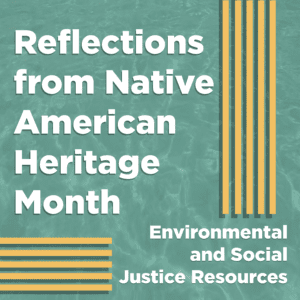November is considered Native American Heritage Month. It is a wonderful opportunity to celebrate the various cultures, art, and traditions of America’s Native peoples. The native experience and perspective are in no way a monolith, so here are some resources highlighting the diverse groups of people that have long worked to cultivate a more resilient, sustainable future.
Here are a few resources to learn more:
The Asian/Pacific/American Institute at NYU, along with the NYU Native Studies Forum and the Lenape Center hosted a exploration into how our community can mutually expand our knowledge of Indigenous Manhattan. Including Lenape leaders, artists, and scholars in dialogue, here is a great resource to better understand issues of environmental stewardship and a changing landscape through various lenses.
We Are Still Here: Native American Heritage Month Film Collection:
Inspired by the works of Native storytellers, the WORLD channel presents a rich selection of voices from various Indigenous communities, including two highlighting environmental causes. Be sure to check out The Blessing and The Seven Generation River. PBS also features four more documentaries following environmental stewards including The Blessing and The Seven Generation River. You can watch here.
The Native American Rights Funds:
Since 1970, the Native American Rights Fund (NARF) has provided legal assistance to Indian tribes, organizations, and individuals nationwide who might otherwise have gone without adequate representation. The Environmental Protection division includes updates on some of the ongoing movements, like the Keystone XL Pipeline, and ways of lending support.
Indigenous Voices at the Intersections of Environmental & Social Justice podcast series
The podcast series is a collection of interviews by Anna Steltenkamp. The series seeks to both decolonize and diversify the voice of media by hearing from the voices of Indigenous leaders, as well as Indigenous-led organizations and initiatives. These individuals are collectively working to achieve environmental and social justice within their own communities and throughout the world.
10 Native American Activists You Should Know:
The title says it all but one important aspect to consider is how intersectionality often shapes the multifaceted approach to a variety of social causes. Having an introduction to some of the figures and the organizations these individuals work with is a great starting point for more information.
Native identity, race and resilience:
This collaborative effort between the Seattle Public Library and Beyond the Frame, shares a list of 25 books highlighting topics around environmental justice, grassroot activism, Native resilience, and how arts and culture can be connected to these themes.

